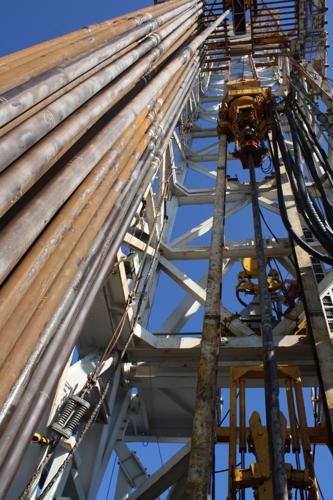A survey of Louisiana oil and gas business found more than 23,000 jobs in the industry are at immediate risk because of the back-to-back blows caused by the coronavirus pandemic and the oil glut generated by Saudi Arabia and Russia.
“The reality is, we are facing a perfect storm right now in the oil market,” said Gifford Briggs, president of the Louisiana Oil and Gas Association, which conducted the survey of its membership. “We have surging supply and an unprecedented destruction of demand.”
LOGA surveyed its 450 members last week to determine the economic impact of both events. It found as many as 16,800 of the 33,650 oil and gas wells operating in Louisiana could be shut in.
That could cause companies to reduce as much as 70% of their workforce in the state over the next three months, Briggs said. Those 23,000 jobs generate $2.2 billion in earnings annually.
“Our members are doing everything they can to keep their doors open and protect their workers, whose livelihoods are at risk,” Briggs said. “But if prices don’t recover above $40 barrel by June 1, my members have told me it’s going to be devastating. We cannot do this alone."
Benchmark U.S. crude oil fell $2.45, or 9.4%, Tuesday to settle at $23.63 per barrel.
Loren Scott, an economist who tracks the outlook for jobs in Louisiana, said by this weekend we should have an idea what will happen to the oil market. On Thursday, OPEC and the Russians will meet to discuss cutting oil production. The Saudis and the Russians have expressed a willingness to cut oil production, if the U.S. also cuts back. Other oil producing nations, including Canada and Norway have also agreed to trim output.
A report issued Tuesday by The U.S. Energy Information Administration forecasts that the U.S. will once again go back to being a net importer of crude oil and natural gas in the third quarter and should continue that way for most of 2021.
If the U.S. also agrees to cuts, then oil prices should “markedly jump back up," even while the global economic slowdown caused by the coronavirus pandemic is still going on, Scott said.
“It’s really a tricky thing,” Scott said, noting that the U.S. oil industry is in the hands of independent companies and not controlled by the federal government. But he said the oil glut also is hammering Saudi Arabia and Russia, and both countries are scared if they continue to produce too much oil, then the supply in storage will weigh down prices for months to come.
To boost the oil industry, LOGA put forth several measures, which include things it has long supported: suspending severance tax collections for one year, ending government-led coastal restoration lawsuits, easing regulations at the Office of Conservation and identifying ways to expedite oil storage capacity.
“The crisis facing the energy industry is not going to go away once the shelter at home order is lifted,” Briggs said. “The ripple effect of the industry struggling will be felt statewide.”
He notes that low oil price could knock out between $330 million and $400 million from the state budget.
Tyler Gray, president and general counsel of the Louisiana Mid-Continent Oil and Gas Association, another industry trade group, said the oil and gas sector has repeatedly demonstrated its resilience in responding to marketplace changes.
“There is geopolitical importance in America being able to produce its own energy, and a reliable energy supply is critically important for combating the pandemic and restarting the economy once its passed,” he said in a statement. “Coming together during this crisis, our industry must work on collaborative, positive solutions that will help our industry and our state recover.”
The pandemic has temporarily cut back the worldwide demand for crude oil by 20%, Gray notes.
Troy Wayman, president and chief executive officer of the regional economic development group One Acadiana, said the additional burden collapsing oil prices would place on the energy industry and businesses across the economy can not be understated.
“Our Acadiana delegation is well aware of this, so we are confident that the state legislature will explore every available option to provide aid,” he said.
Acadiana Business Today: Coronavirus spread in Acadiana may be slowing; Viemed Healthcare sending equipment to patients in Louisiana, across the country to battle COVID-19
The spread of the new coronavirus in Acadiana may be slowing, the latest data from the state health department suggests.
Lafayette-based Viemed Healthcare is sending equipment and respiratory therapists to hospitals in Louisiana and across the country to assist w…
Stuller, Inc., North America’s largest fine jewelry manufacturer, will resume shipping in-stock items on Monday after suspending operations Ma…
A survey of Louisiana oil and gas business found more than 23,000 jobs in the industry are at immediate risk because of the back-to-back blows…
Lafayette hospitals have long had emergency surge plans in place to make way for an influx of patients during a mass casualty event, but they'…
One Acadiana is partnering with Eat Lafayette and other agencies to ask residents to order takeout, delivery or curbside meals from local rest…












